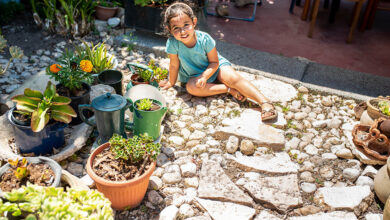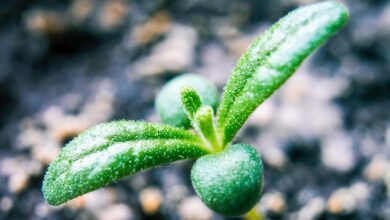
10 Sustainable Habits to Implement at Home
- 1) Buy energy-efficient appliances
- 2) Choose sustainable furniture
- 3) Shop sustainable
- 4) Buy sustainable
- 5) Eat sustainably
- 6) Grow your own vegetable garden
- 7) Recycle containers
- 8) Use sustainable cleaning products
- 9) Mind those open taps
- 10) Fill your cupboard with sustainable fashion
Sustainable habits are becoming more and more prevalent in our society.
Big retail stores are trying to minimise their waste, governments are seeking solutions to generate clean energy, and society, in general, has turned towards a greener way of living.
Sustainability is not just about considering the environment. It also means leaving a better world behind for future generations.
It is expected that the annual waste generation will be 3.4 billion tonnes by the year 2050. This is a 70% increase from data recorded in 2016.
The sooner we start implementing sustainable habits, the better. Here are 10 sustainable habits that you can start at home.
1) Buy energy-efficient appliances
This does not mean that you have to immediately buy new appliances.
The next time you need to buy a new fridge or a new washing machine, check to see whether there are eco-friendly options.
Most new appliances are energy-saving which means that you help save electricity (and on your bill at the end of the month!).
2) Choose sustainable furniture
If you are thinking about redecorating your home, don’t throw out your old furniture just yet.
Upcycling is a great example of sustainable living and you don’t have to spend money on new items.
Rather have a look at how you can recreate your current furniture into something new.
Maybe the sofa only needs to be reupholstered or the end tables need a fresh coat of varnish to make it look new again.
3) Shop sustainable
How often do you go to the supermarket and buy plastic bags when you have a million of them at home?
Get into the habit of taking your own bags with you when you go shopping.
A great way to remember them is to hang them near the front door. This way you can just grab them and go.
4) Buy sustainable
Whilst you are out shopping (with your own shopping bag, of course) be mindful of the origin of the products you buy.
If you opt for locally produced products you are contributing to the growth of the local economy.
You also help to cut down on the exhaustive supply chain process involved in importing and exporting. It is a great way to be eco-friendly and support local businesses.
Related Reading: Moving to solo with solar? Enlightening factors to consider
5) Eat sustainably
When you are perusing the delicious range of locally produced foods, opt for more sustainable food choices.
Try to move away from meat and more towards plant-based foods, fruits and vegetables.
According to statistics, about 15% of all greenhouse emissions come from the meat industry.
This is something we can help minimize by eating less of it. You can then also use peels and leftover fruits and veggies as compost…
6) Grow your own vegetables
…in your own vegetable garden!
If you don’t have one already, then now is the perfect time to start.
You don’t have to have a huge garden to grow veggies.
Many vegetables can be grown on a small patch of ground or even in plastic soda bottles (another sustainable recycling tip!).
From leafy greens to juicy tomatoes, just imagine how delicious your meals will be with veggies that you grew yourself.
Related Reading: How to Reduce your Living Expenses
7) Recycle containers
Reusing containers and jars in your kitchen is about as sustainable as you can get.
Instead of throwing away things like mayonnaise or jam jars, rather use them to store something else.
If you clean it out and remove the label, they are great for storing things like flour, sugar, salt, nuts, seeds, coffee, tea… the list goes on!
8) Use sustainable cleaning products
You can easily make your own cleaning products and they are not as harsh on your surfaces as cleaning products that contain chemicals.
It is amazing what you can clean with a vinegar, water, and lemon juice solution.
If you are unable to make your own, then you can opt for an environmentally-friendly choice when buying cleaning agents.
Be sure to choose products that are free of toxins and harmful chemicals.
9) Mind those open taps
It often happens that we get busy with something else whilst the tap is running. Get into the habit of turning off the water when you are not using it.
You can also catch rainwater or excess water from the shower and reuse it in the garden.
Related Reading: Simple Ways to Save Water in the Kitchen
10) Fill your cupboard with sustainable fashion
The days of fast fashion are grinding to a halt. People don’t want to buy garments that tear after three washes before they have to replace them.
Many brands are moving towards sustainable fabrics like organic cotton, bamboo, and hemp. Look out for sustainable clothing. You’ll find that they will last longer, too.
You can also hit thrift shops and score a few bargains there. You will be surprised to find out what people throw away and most of the time it is still in excellent condition.
Final thoughts
Sustainable habits are about more than just thinking about the environment. It is about the world of tomorrow.
If we continue wasting and abusing natural resources, what will we be left with?
Even though you are just one person, by making these small changes, you are already making a huge difference.
Loved discovering this? Why not sign up for our popular bi-weekly newsletter?
Follow and like us on ❤ Instagram ❤ Facebook ❤ Twitter ❤ LinkedIn ❤ YouTube ❤ Pinterest for updates.
Looking to buy or rent a property in South Africa? Start your search on ImmoAfrica.net! Find cheap and affordable properties for sale and rent in the following popular areas:
Gauteng
Akasia, Alberton, Bedfordview, Benoni, Boksburg, Centurion, Edenvale, Johannesburg, Kempton Park, Midrand, Pretoria, Randburg, Roodepoort, Sandton, Soweto
Western Cape
Atlantic Seaboard, Bellville, Cape Town, Durbanville, Gordons Bay, George, Hermanus, Knysna, Mossel Bay, Paarl, Plettenberg Bay, Somerset West, Stellenbosch
KwaZulu Natal
Amanzimtoti, Ballito, Durban, Hillcrest, La Mercy, Margate, Pinetown, Pietermaritzburg, Umdloti, Umhlanga, Westville, Zimbali
Rest of South Africa
Bloemfontein, East London, Hartbeespoort, Hoedspruit, Nelspruit, Polokwane, Port Elizabeth, Potchefstroom, Rustenburg, St. Frances Bay, Witbank






